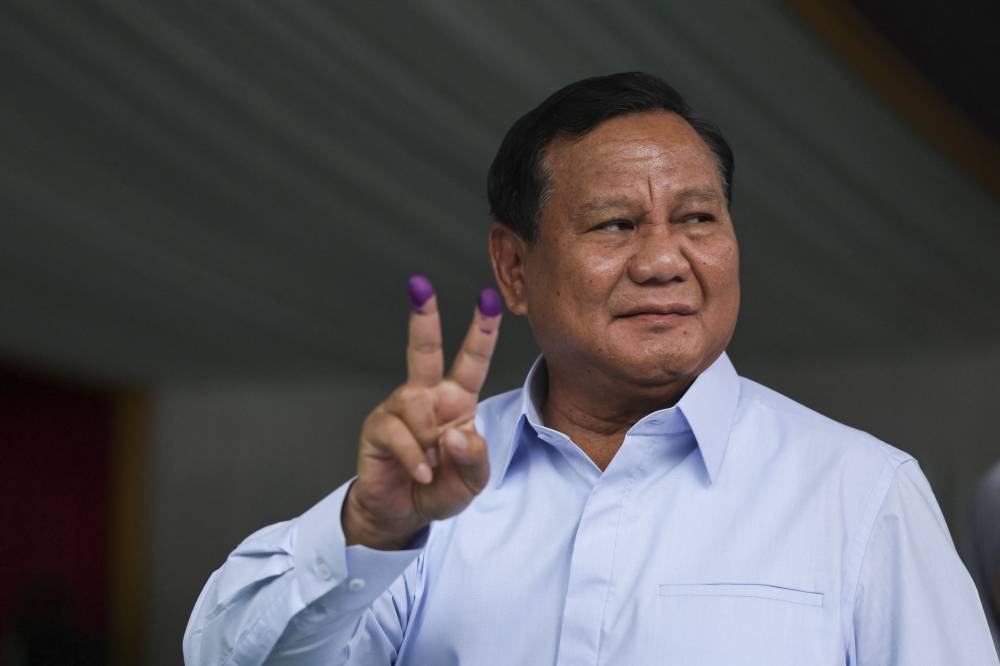Indonesia votes for president with ex-general Subianto the favourite

JAKARTA - Indonesians began voting for a new president Wednesday with Defence Minister Prabowo Subianto the frontrunner to lead Southeast Asia's biggest economy despite concerns over his human rights record.
Polls project Subianto, a military chief during the Suharto dictatorship a generation ago, to secure a majority and replace popular outgoing leader Joko Widodo as observers claim the president indirectly supported his campaign.
The 72-year-old ex-general is the clear favourite to win and avoid a second-round vote after a campaign mixing populist rhetoric with pledges to continue the policies of Widodo, who has presided over steady economic growth but reached the constitutional two-term limit.
"We will fight to bring prosperity for all people of Indonesia. We will continue what was already being built by previous presidents," Subianto told supporters at a weekend campaign rally.
Nearly 205 million people are eligible to vote for Subianto or his rivals, Anies Baswedan and Ganjar Pranowo, in just the fifth presidential election since the end of Suharto's dictatorship in 1998.
Polling stations opened at 7.00am (2200 GMT) in the easternmost region of Papua and were due to close at 01.00pm (0600 GMT) at the other end of the country in jungle-clad Sumatra.
In Papua's Timika city, officials inspected makeshift polling stations built from logs, metal sheets and palm leaves as voters arrived to eye candidate lists.
"I will vote for the one who would be the best to develop Papua," 19-year-old student Daton, who only gave his first name, told AFP from the region where separatists have waged a decades-long insurgency.
A thunderstorm deluged the streets of capital Jakarta before polls opened, flooding some areas and causing some polling stations to open late.
But 57-year-old consultant Debbie Sianturi was determined to vote.
"I want to have leader that will continue the democracy," she said.
Subianto needs to claim more than 50 per cent of the overall vote and at least a fifth of ballots cast in over half the country's 38 provinces to secure the presidency.
- Democracy commitment -
Former Jakarta governor Baswedan, widely seen as the favourite to challenge Subianto in the event of a second-round runoff vote, told his supporters to help ensure a fair vote.
"Come back to the voting station, monitor the vote count, and report it to platforms that monitor the vote counts," he told reporters.
Former Central Java governor Pranowo, who has fallen to third in polls after being the initial front-runner, said Wednesday that "everyone hopes for a clean election".
Rights groups have expressed alarm that Subianto could roll back hard-won democratic freedoms, pointing to accusations he ordered the abduction of democracy activists at the end of Suharto's rule.
Subianto was dismissed from the military in 1998 over the abductions. The United States for years refused him a visa, but he denied the accusations and was never charged.
"We've been always worried about his commitment towards democracy," said Yoes Kenawas, a researcher at Jakarta-based Atma Jaya Catholic University.
"If he wins the election, those questions will always linger."
But Subianto has since rehabilitated his image, thanks in part to a savvy social media campaign targeting Indonesia's youth in which he is portrayed as a "cuddly grandpa".
Another key factor in his popularity is having Widodo's eldest son, Gibran Rakabuming Raka, as his vice presidential running mate.
Widodo enjoys near-record approval ratings after two terms of solid economic growth and relatively stable politics in the nation's young democracy.
But some legal experts and rights groups have accused Widodo of improperly using government funds to support Subianto.
- 'Just attacks' -
Questions have also been raised over how Raka, 36, became Subianto's running mate.
In October, Indonesia's then-chief justice, who is Widodo's brother-in-law, changed rules that had barred candidates below the age of 40 from running for high office.
Subianto and his aides have rejected all accusations of impropriety.
More than 800,000 polling stations will be operating on Wednesday, which was declared a national holiday for the country's nearly 280 million people.
The logistical feat saw planes, helicopters, speedboats and even cows cart ballots around the sprawling archipelago.
More than 5.7 million workers will man polling stations, open for just six hours. Over 20,000 seats are up for grabs from district level to national parliamentary seats and the presidency.
Official results are not expected until March, but so-called "quick counts" are expected to give a reliable indication of the winner later Wednesday. - Dessy Sagita and Jack Moore / AFP









